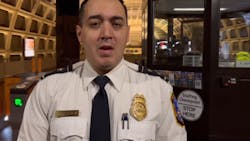WMATA MTPD to enhance fare evasion citations
The Washington Metropolitan Area Transit Authority (WMATA) Metro Transit Police (MTPD) will enhance the issuing of citations for fare evasion in the District of Columbia beginning March 18. The enhancement of citations for fare evasion follows the passage of the Secure DC Bill, the emergency legislation that was passed unanimously by the Washington, D.C., Council and signed by District of Columbia Mayor Muriel Bowser that includes a provision requiring anyone stopped for fare evasion to provide their true name and address, allowing police officers to issue civil citations.
The new law also increases the penalty for assaulting bus and rail operators or WMATA employees under the Transit Operator Protection and Enhanced Penalty Amendment Act.
Before the Secure DC Bill passed, MTPD officers could engage an individual who did not pay the fare but were unable to compel compliance. Instead, officers could only ask an individual to leave the station or go back and pay their fare, severely limiting enforcement efforts. Under the new law, anyone who refuses to provide their true name and address may be arrested and face a fine of up to $100 for failing to comply.
In November 2022, WMATA launched a new safety initiative to crack down on fare evasion. The civil fine in the District of Columbia is $50 and in Virginia and Maryland, fare evasion is a criminal violation, punishable by up to a $100 fine. WMATA is also in the process of modifying faregates at all 98 Metrorail stations with new salon-style doors that make fare evasion more difficult.
The Secure DC Bill provides additional tools for MTPD to stop and deter criminal behavior. The changes to the bill also support WMATA’s Strategic Transformation Plan to provide safe, reliable service, support equity and sustainability, protect employees and foster collaboration with our regional partners.
WMATA offers reduced fare programs, including Metro Lift for Supplemental Nutritional Assistance Program recipients, seniors and student programs to make WMATA equitable and affordable for everyone in the region to use public transit.
